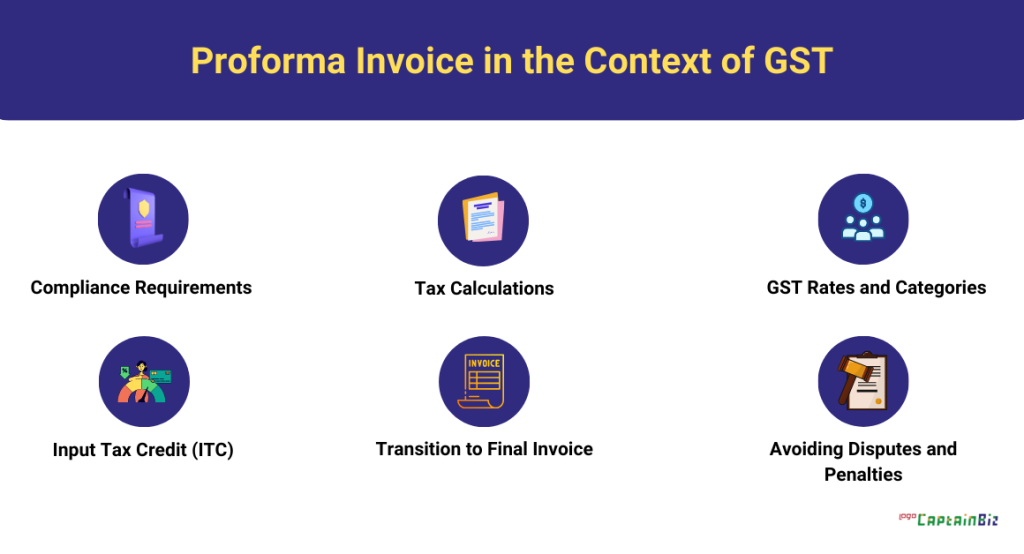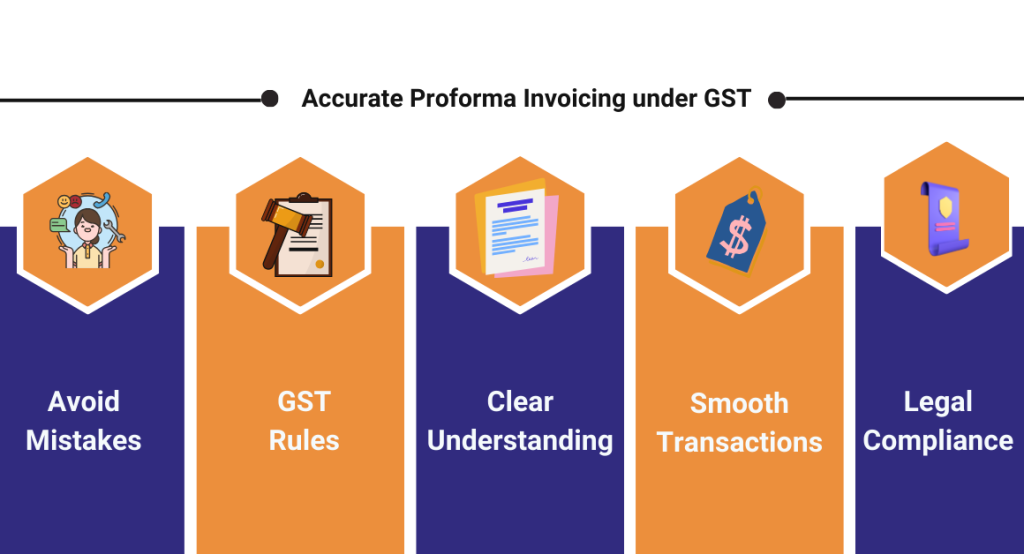What is Proforma Invoice?
A proforma invoice, defined as an early version of a bill, follows a GST-compliant format and is sent by sellers to buyers as a preview before delivering goods or services. This document, acting like a shopping list, includes details such as product descriptions, estimated costs, and important terms. Proforma invoices are crucial for businesses, ensuring both parties agree on what’s being sold and at what cost, serving as a pre-deal agreement. The importance of proforma invoices lies in their role in avoiding misunderstandings, planning transactions, and maintaining transparency, especially in international trade. In the context of GST, proforma invoices help businesses adhere to regulations, providing estimates before the actual transaction, acting as a ‘before’ snapshot for planning and budgeting.
Understanding GST and Its Relevance to Invoices
GST, short for Goods and Services Tax, is a type of tax applied when you buy goods or services. Introduced by the government to simplify the tax system, it replaces various confusing taxes and helps prevent tax evasion. For example, if you buy a mobile phone for Rs. 10,000 with an 18% GST rate, the GST amount is Rs. 1,800, making the total cost Rs. 11,800. This GST amount is paid to the government by the seller. Invoices are relevant to GST as they show the tax component, ensuring pricing transparency and compliance with tax regulations when a business issues them for products or services.
For example, an invoice for a product costing Rs. 10,000 with an 18% GST rate would include the following:
- Product Cost: Rs. 10,000
- GST Amount: Rs. 1,800 (18% of Rs. 10,000)
- Total Invoice Amount: Rs. 11,800 (Product Cost + GST Amount)
Including the GST details on the invoice helps both the buyer and the seller understand the tax implications of the transaction. It also ensures that the correct amount of GST is collected by the seller for remittance to the government.
Proforma Invoice Essentials
A proforma invoice, like a detailed shopping list before you buy something, should have:
- Date of Issue: When the proforma invoice is created, so everyone knows when it’s valid.
- Seller and Buyer Details (Address, Contact, etc.): Clear information about who is selling and who is buying, including where to reach them.
- Details of Goods/Services: A clear and detailed list or explanation of what is being bought or sold. If it’s a service, what exactly is being done?
- Quantities: How much of the product or service is involved? Is it one item, five, or more?
- Prices of Goods: The cost of each item or service – how much you have to pay for each thing.
- Validity of Offered Price: How long the prices on the proforma invoice are valid. This helps in case prices change over time.
- Payment Terms/Method: Clear instructions on when and how payment should be made.
- Applicable Taxes, if Any: If there are taxes involved, they should be clearly mentioned. No surprises!
- Shipping Costs, if Any: If there are additional charges for shipping, they should be included in the proforma invoice.
- Proforma Invoice Number, if Applicable: A unique number for the proforma invoice helps in tracking and referencing.
- Labeled “Proforma Invoice”: Clearly marking it as a proforma invoice so there’s no confusion.
- Labeled “Not a Tax Invoice”: Making it clear that this is not the final bill but a preview.
Also read: Invoice Terms And Conditions For Indian Businesses
Benefits and Advantages of Proforma Invoices
Using proforma invoices in business transactions comes with several advantages:
-
Clarity in Transactions:
- Proforma invoices give a clear preview of the deal, ensuring both buyer and seller understand terms before finalizing the transaction.
-
Financial Planning:
- Proforma invoices aid in financial planning, helping businesses estimate costs and revenue for more effective budgeting.
-
Formal Quotation:
- Acting as a formal quotation, a proforma invoice states the seller’s intent to deliver goods or services, including estimated costs.
-
International Trade Facilitation:
- In international trade, proforma invoices assist in complying with regulations and facilitate smoother cross-border transactions, considering factors like customs duties.
-
Preventing Misunderstandings:
- By detailing goods or services, quantities, prices, and terms, proforma invoices reduce chances of misunderstandings or disputes between parties.
-
Agreement Before Actual Transaction:
- Proforma invoices serve as an agreement before the actual deal, creating commitment and understanding between the buyer and the seller.
-
Legal Compliance:
- Inclusive of necessary details and appropriately labeled, proforma invoices ensure legal compliance, avoiding potential legal issues.
Also Read: Understanding The Applicability Of GST On Proforma Invoices
Proforma Invoice in the Context of GST

Proforma invoices play a crucial role within the broader framework of the GST, considering compliance requirements, tax calculations, and specific considerations related to GST. Here’s how:
-
Compliance Requirements:
- Proforma invoices are crucial for GST compliance, meeting preliminary document standards with accurate transaction details and clear indication of applicable GST rates.
-
Tax Calculations:
- Proforma invoices transparently communicate tax implications by accurately calculating and mentioning the GST component, making both buyer and seller aware of tax obligations.
-
GST Rates and Categories:
- Considering diverse GST rates, proforma invoices specify the correct rate for precise tax calculations, ensuring alignment with different categories of goods and services.
-
Input Tax Credit (ITC):
- For businesses in the supply chain, GST-compliant proforma invoices enable accurate Input Tax Credit claims by providing necessary information to the buyer.
-
Transition to Final Invoice:
- Proforma invoices act as a precursor to the final invoice, guiding the transition. Businesses must ensure the final invoice aligns with GST regulations, reflecting actual transaction details.
-
Avoiding Disputes and Penalties:
- Ensuring GST compliance in proforma invoices helps avoid disputes and penalties, establishing clarity and mutual understanding for a smoother and legally sound transaction.
Importance of Accurate Proforma Invoicing under GST

Being precise when making a proforma invoice in the context of GST is really important. Here’s why:
-
Avoid Mistakes:
- Careful details on the proforma invoice prevent mistakes, avoiding confusion and potential legal issues.
-
GST Rules:
- Following GST rules is crucial, and accurate proforma invoicing ensures compliance from the start, preventing issues later on.
-
Clear Understanding:
- Accurate proforma invoices provide a clear understanding for both buyer and seller, avoiding misunderstandings about goods, services, and taxes.
-
Smooth Transactions:
- Accurate proforma invoices contribute to smoother buying and selling processes, ensuring everyone knows what to expect, especially regarding taxes like GST.
-
Legal Compliance:
- Accurate proforma invoicing ensures businesses follow rules and laws, especially concerning taxes like GST, staying on the right side of legal compliance.
Creating a Proforma Invoice under GST Guidelines
When making a proforma invoice under GST rules, follow these steps to stay in line with the guidelines:
-
Header Information:
- Include the word “Proforma Invoice” prominently at the top.
- Add the unique proforma invoice number for tracking purposes.
-
Date and Validity:
- Clearly mention the date of issuing the proforma invoice.
- Specify the validity period to let the buyer know until when the prices are applicable.
-
Seller and Buyer Details:
- Provide complete details of the seller, including name, address, and GSTIN (Goods and Services Tax Identification Number).
- Include the buyer’s details, such as name and address.
-
Goods/Services Description:
- List the goods or services being offered in detail. Be specific about quantity, quality, and specifications.
-
Quantities and Prices:
- Clearly state the quantities of each item or the scope of services.
- Mention the prices of goods or services per unit.
-
GST Details:
- Include GST details for each item, specifying the applicable GST rate.
- Clearly indicate whether the prices are inclusive or exclusive of GST.
-
Total Amount:
- Calculate and show the total amount, including the GST component.
-
Payment Terms:
- Outline the agreed-upon payment terms, specifying when and how the payment should be made.
-
Additional Costs:
- If applicable, include any extra costs such as shipping charges.
-
Terms and Conditions:
- Outline any special terms or conditions agreed upon by both parties.
-
Bank Details of Supplier:
- Include the bank details of the supplier for clarity and transparency in payment transactions.
-
Certifications Required by Customs Authorities (if any):
- If there are specific certifications needed by Customs Authorities, include them as part of the documentation.
-
Legal Disclaimer:
- Include a disclaimer stating that it’s a proforma invoice and not a final tax invoice.
-
Signature by an Authorized Person from the Supplier’s Company:
- Ensure that the proforma invoice is signed by an authorized person from the supplier’s company for formal acknowledgment.
-
Save and Share:
- Save a copy for your records and share the proforma invoice with the buyer.
Also Read: Proforma Invoice under GST
Common Mistakes to Avoid in Proforma Invoicing under GST
When making a proforma invoice under GST, watch out for these common mistakes:
-
Forgetting Important Details: Don’t leave out crucial information like item descriptions, quantities, or prices. Include everything clearly.
-
Ignoring GST Rates: Be aware of the correct GST rates for your goods or services. Not considering these rates can lead to errors.
-
Skipping Payment Terms: Clearly state when and how you expect to be paid. Skipping this can cause confusion.
-
Not Checking Validity Dates: Mention how long the prices on the proforma invoice are valid. Forgetting this can lead to misunderstandings later.
-
Neglecting Certifications: If Customs Authorities require specific certifications, make sure you include them. Neglecting this can cause issues during customs clearance.
-
Leaving Out Authorized Signature: An authorized person from your company should sign the proforma invoice. Skipping this might make it less official.
-
Not Clearly Labeling as “Not a Tax Invoice”: Clearly state that it’s a proforma invoice and not the final bill. This helps avoid confusion.
-
Ignoring Applicable Taxes: Specify if prices include GST or not. Ignoring this can lead to incorrect tax calculations.
-
Overlooking Additional Costs: If there are extra charges like shipping costs, include them. Overlooking this can lead to unexpected expenses for the buyer.
Conclusion
So, in conclusion, a proforma invoice is like an early shopping list businesses use before selling something. When it comes to GST, it’s crucial to get it right. Include all the details like item descriptions, prices, and payment terms. Mastering proforma invoicing under GST is crucial for clear business transactions. Accuracy is key, ensuring benefits like effective planning and clear communication. Creating a proforma invoice demands attention, optimizing financial efficiency. However, challenges lurk, emphasizing the importance of avoiding common mistakes. In summary, a well-crafted proforma invoice is a cornerstone for successful, compliant business transactions in the ever-evolving world of commerce.
FAQ’s
-
What exactly is a proforma invoice and why is it used?
A proforma invoice is like an early shopping list before a sale. It’s used to show the buyer what’s for sale and at what cost before the actual deal.
-
How does GST relate to invoices, and why is it important to understand it?
GST is a tax added to the cost of goods and services. Understanding it is crucial for accurate invoicing and ensures compliance with tax regulations.
-
Can you explain the essential elements of a proforma invoice?
Key elements include seller and buyer details, goods or services descriptions, quantities, prices, payment terms, and applicable taxes.
-
What benefits do businesses gain from using proforma invoices?
Benefits include clarity in transactions, better financial planning, formal quotations, and transparency in international trade.
-
How does a proforma invoice fit into the whole GST system?
It aligns with GST rules by including tax details, helping in accurate tax calculations and facilitating smooth compliance.
-
Why is accuracy emphasized when creating proforma invoices under GST?
Accuracy ensures clear communication, avoids mistakes in tax calculations, and helps businesses stay compliant with GST regulations.
-
What are the specific steps to follow when making a proforma invoice under GST guidelines?
Steps include adding a unique number, mentioning the date, providing seller and buyer details, specifying goods or services, stating quantities and prices, including GST details, and outlining payment terms.
-
Can you highlight some mistakes businesses commonly make in proforma invoicing under GST?
Common mistakes include forgetting important details, not checking GST rates, skipping payment terms, and missing bank details or certifications.
-
Why is it necessary to include bank details and certifications in a proforma invoice?
Including bank details ensures smooth transactions, and certifications are needed for compliance, especially with Customs Authorities.
-
How does a proforma invoice contribute to smooth and compliant business transactions?
It provides a clear agreement before a deal, preventing misunderstandings, aiding financial planning, and ensuring compliance with tax regulations.

